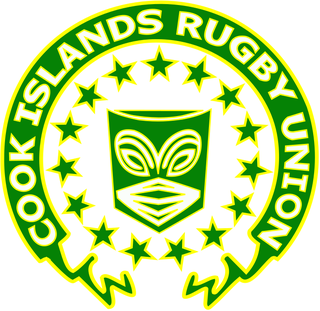
Rugby World Cup qualification is a process that determines which nations will compete at the Rugby World Cup, a men's rugby union competition.

The Cook Islands is a third tier rugby union playing nation. They began playing international rugby in early 1971. Thus far, the Cook Islands have not made an appearance at any of the World Cups.
The Fiji women's national rugby union team are a national sporting side of Fiji, representing them at rugby union. They played their first test against Samoa in 2006, and compete annually in the Oceania Rugby Women's Championship. In 2022, they created history when they scored the third-highest points in both Men's and Women's Rugby at the Oceania Championship when they trounced Papua New Guinea 152–0. They made their first Rugby World Cup appearance at the delayed tournament in New Zealand.

2011 Rugby World Cup qualifying began at the 2007 tournament in France, where twelve teams earned a place in the finals of the tournament, this automatically qualified them for the 2011 Rugby World Cup in New Zealand.

The Oceania Rugby Men's Championship is an international rugby union competition for countries and territories from Oceania with national teams in the developmental band. It is administered by Oceania Rugby.
In the Americas Region for 2015 Rugby World Cup qualifying, Argentina had automatically qualified for the World Cup, and two places were available in the Americas qualification process, which were taken by Canada and the United States. An additional Americas team, Uruguay, also qualified as the Play-off winner.

For the 2015 Rugby World Cup qualifying, there were three inter-confederation play-offs to determine the final qualification spot to the 2015 Rugby World Cup. The process ended with the 20th and final team to qualify for the World Cup. Four teams, the best non-qualifier from each region except Oceania, competed for the last place at the Rugby World Cup finals in England. Uruguay won the final play, thus becoming the 20th qualifier for the World Cup and joined hosts England, Australia, Wales and Fiji in Pool A.
The Africa section of 2015 Rugby World Cup qualifying saw thirteen teams competing for one direct qualification spot into the final tournament in England, and one spot in the Repechage play-offs.
The European Zone of qualification for the 2015 Rugby World Cup saw 31 teams competing for two places at the finals in England and one place in the Repechage playoff. Georgia and Romania qualified directly to the Rugby World Cup as Europe 1 and Europe 2, and will play in Pools C and D respectively. Russia finished third to qualify for the repechage playoff, but losing to Uruguay in the final Qualification round.

The 2018 Rugby World Cup Sevens was the seventh edition of the Rugby World Cup Sevens. Organized by World Rugby, it was held at AT&T Park, now known as Oracle Park, in San Francisco, United States. A total of 84 matches were played over three days from July 20–22, 2018. The men's tournament had 24 teams and the women's tournament 16, with both tournaments being played for the first time in a knock-out only format. New Zealand won the championship for both events — defeating England in the men's final and France in the women's final.
The 2013 FORU Oceania Cup for national rugby union teams in the Oceania region was held in Papua New Guinea at the Lloyd Robson Oval in Port Moresby from 6 to 13 July.

The qualification process for the 2019 Rugby World Cup in Japan began during the pool stages of the 2015 tournament in England, during which the top three teams from each of the four pools were awarded automatic qualification for the 2019 event. A further eight teams qualified through regional, cross-regional tournaments and the repechage process.
The qualification process for the 2017 Women's Rugby World Cup began on 14 February 2015. Twelve teams qualified for the tournament, which was held in Ireland in 2017.
Qualifying for the 2019 Rugby World Cup for Oceania Rugby began in June 2016, where across 2 years, 3 teams competed for two direct qualification spots from Oceania. Two places were available to Oceania in a cross-regional play-off series' to qualify for the World Cup and or advance through the Repechage.
This is the qualifications of the 2018 Rugby World Cup Sevens – Women's tournament aimed at selecting women's Rugby sevens national teams that appeared in the finals in San Francisco. A total of 52 nations took part in the qualifying process.
The 2017 Oceania Sevens Championship was the tenth Oceania Sevens in men's rugby sevens. It was held at ANZ Stadium in Suva, Fiji on 10–11 November 2017. The tournament was won by Fiji who defeated New Zealand 26–0 in the final.
The qualification process of women's teams for the 2013 Rugby World Cup Sevens. Automatic qualification was extended to the host and the four semifinalists of the previous cup's tournament. The remaining spots were contested in each of the six regions' respective tournaments.
The women's tournament for the 2022 Rugby World Cup Sevens was held in Cape Town, South Africa from 9 to 11 September at the Cape Town Stadium.
The qualification process for the 2010 Women's Rugby World Cup began on 6 February 2009. A total of 12 teams qualified for the tournament, which was held in England between 20 August – 5 September 2010.
The men's tournament for the 2022 Rugby World Cup Sevens was held in Cape Town, South Africa from 9 to 11 September at the Cape Town Stadium.
 Cook Islands (54)
Cook Islands (54) Fiji (14)
Fiji (14) Papua New Guinea (49)
Papua New Guinea (49) Solomon Islands (70)
Solomon Islands (70) Tahiti (86)
Tahiti (86) Australia (Automatic qualifier)
Australia (Automatic qualifier) New Zealand (Automatic qualifier)
New Zealand (Automatic qualifier) Samoa (Automatic qualifier)
Samoa (Automatic qualifier) Tonga (Automatic qualifier)
Tonga (Automatic qualifier) Fiji (Oceania 1)
Fiji (Oceania 1)





